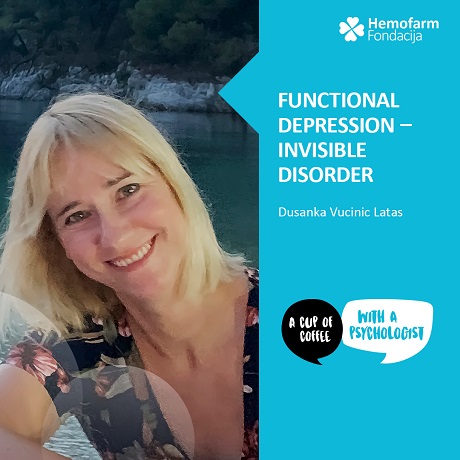
29/06/2020
Functional Depression – Invisible Disorder
Prof. Dusanka Vucinic Latas
Dr Med Sci Spec. of Medical Psychology, Dr Dragisa Misović-Dedinje Clinical Centre, Psychiatric Hospital
Functional Depression – Invisible Disorder
Functional depression is a term which does not exist as an official psychiatric diagnosis. Instead, it denotes a particular set of psychopathological manifestations which corresponds to a depressive disorder consistent with its characteristics, and yet it has its own specific features. In professional literature, it can be found under the name of ‘high-functioning depression’, which actually implies the presence of depressive symptoms in people who are functional in many areas of life, whereby their inner suffering is invisible and hidden from the environment.
Functional depression is similar to the so-called ‘masked depression’, i.e. a depressive disorder manifested by an atypical clinical picture, dominated by somatisation, namely, various physical disorders and ailments or chronic pain (for which no medical cause can be determined), and all this without a visible depressive mood. The concept of functional depression is very similar to dysthymia, which implies chronic sub-depressive mood (which means that the depression does not reach the intensity required to verify a depressive episode diagnosis) that lasts for years. However, the key difference lies in the external manifestation of disturbances. Namely, the majority of psychiatric disorders, including depression, is characterised by reduced functionality, i.e. difficulties in learning, at work, and in relationships with other people. The absence of these external signs of dysfunction coupled with the presence of strong emotional suffering and depression which is ‘invisible’, concealed even from the closest people, is the key feature of the so-called functional depression. Although all the symptoms of depression may be present, the key difference is that their environment perceives such persons not only as persons without or without obvious psychological disturbances – as opposed to depressive persons in whom their environment can perceive disturbances, but they even try hard to attain professional success, to have rich social life, and they do not appear to their environment, even to those closest to them, as if they have any major disturbance inside. However, in their inner world, deeply concealed from others, lies an intensive feeling of despair, emptiness and depression.
Why do people suffering from the so-called ‘functional depression’ tend to conceal their internal depression? What we know is that they themselves often feel they simulate their own life, sometimes trying to signal to their environment that not everything is so perfect, yet they still play their roles of successful and satisfied people. These are usually people who have high, exaggerated expectations of themselves, without a developed inner capacity to forgive mistakes to themselves, to get calm and endure painful feelings in situations of loss, failure or some other negative life events. In addition, these are sometimes persons who depend too much on approval, admiration and acceptance of their environment and who are not capable of sharing their inner grief, helplessness, and imperfections and seeking help from others, at the expense of great inner suffering and isolation. Some people have pronounced narcissistic features, and such people are intensively, overwhelmingly and actually fatally attracted to their own ego ideal (what I would like to be). Ego ideal is present in all people and it serves to secure self-respect and feeling of purpose. However, in pathological narcissism, aspirations, ambitions, and ideals that derive from the ego ideal become destructive and demanding images of ‘perfection and omnipotence’, which must be achieved at any cost; and the narcissistic ego is so demanding that it keeps a person subjugated to such an extent that he/she will rather agree to kill his/her real ego than to give up the demands of the ideal ego.
The time we are living in, i.e. the time of COVID 19 pandemic is in fact the greatest in vivo psychological experiment in the recent history of mankind. Thousands of research projects on consequences of the pandemic for the mental health are underway worldwide as well as in our country and we are yet to see in the future what will have happened to us and how much we will have changed. In psychological terms, the crisis we are living in means simultaneous presence of a number of traumatic factors: feelings of threat from an unknown and invisible enemy, fear of death, fear of losing loved ones, confusion in options of protecting oneself, fear of existential economic consequences, and social isolation never seen before.
The world we live in, which seemed more or less safe, changed overnight and our basic feeling of security and the feeling of managing our own lives have been disturbed. Faced with such challenges, we all leave the state of psychological balance. People suffering from psychological problems usually react to acute crises by reducing their symptomatology; however, worsening arrives with the end of the crisis. We can expect the same with the people suffering from functional depression, who were ‘hiding’ their suffering and anxiety as long as the crisis lasted, using their customary mechanisms. Now, in the time of returning to ‘normality’, they are facing huge challenges, yet without the aptitude to share their inner suffering with others.
The most important message is, if we notice that someone in our environment has some psychological torment, we must not agree to silence about it and we should try to encourage them to consult psychologists and other professionals who can help them reduce their inner darkness.

AUTHOR
Prof. Dusanka Vucinic Latas
Dr Med Sci Spec. of Medical Psychology, Dr Dragisa Misović-Dedinje Clinical Centre, Psychiatric Hospital